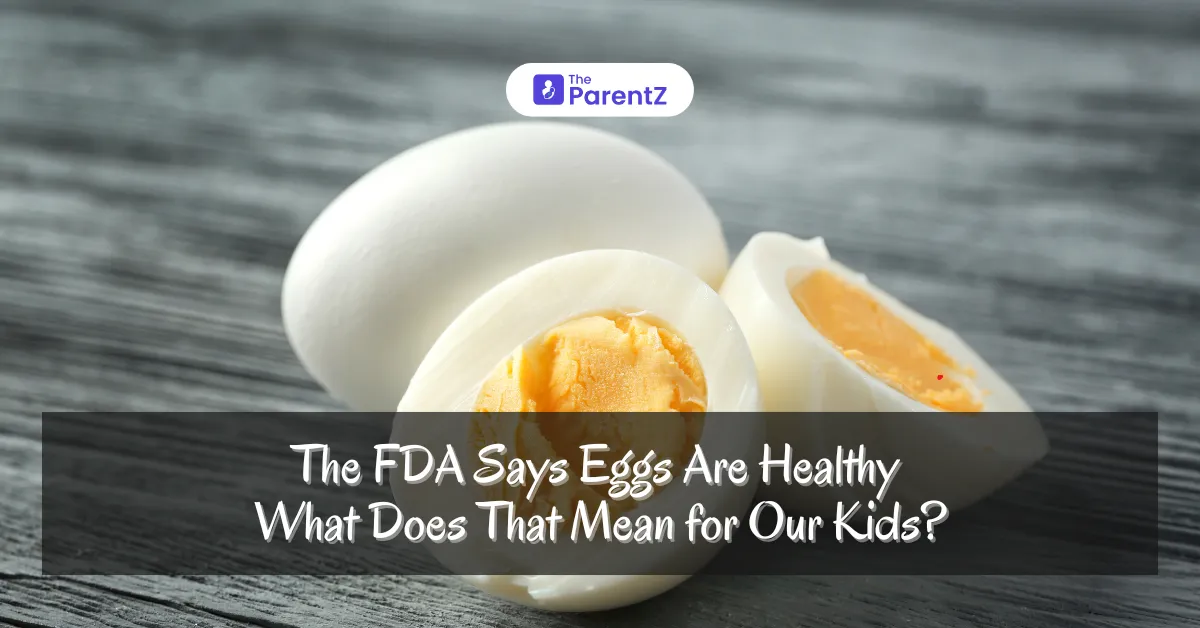For years, eggs have been a bit of a nutritional rollercoaster. One minute, they're good; the next, they're bad. It's enough to make any parent's head spin! But recently, the U.S. Food and Drug Administration (FDA) made a big announcement: eggs now officially meet their updated definition of "healthy." This is a pretty big deal, and a lot of parents are wondering: What does this mean for my kids?
Let's break it down in simple terms. The FDA's job is to make sure the food we eat is safe and that we have the information we need to make healthy choices. They have a definition of "healthy" that helps us understand which foods contribute to a good diet. This definition recently got an update, and eggs now fit the bill!
What Does the FDA's Update Mean?
The FDA's new definition of "healthy" is based on current nutrition science and aims to promote healthy eating patterns among Americans. Under this updated guideline, foods that are nutrient-dense and contribute positively to overall health can proudly wear the "healthy" label. Eggs have now joined the ranks of other nutritious foods like vegetables, fruits, whole grains, and lean proteins.
Why the Change?
The FDA's old definition of "healthy" focused a lot on limiting things like fat and cholesterol. We now know that some fats are actually good for us and that dietary cholesterol (the cholesterol we eat) doesn't have as big an impact on our blood cholesterol as we once thought. The new definition focuses more on overall eating patterns and getting enough important nutrients. It recognizes that foods like eggs, which are packed with goodness, play a vital role in a healthy diet.
What Makes Eggs So Great for Kids?
Eggs are like little nutritional powerhouses. They're full of things growing kids need:
- Protein: It is important for building and repairing tissues, which is super important for growing bodies. Think of it as the building blocks for muscles, bones, and even hair!
- Vitamins and Minerals: Eggs contain a wide range of vitamins and minerals, including vitamin D (important for strong bones), vitamin B12 (important for brain function), choline (important for brain development and memory), lutein (important for eye health, an extra plus point in our screen-filled world), and iron (important for carrying oxygen in the blood).
- Healthy Fats: While eggs do contain fat, much of it is in the form of healthy unsaturated fats, which are important for brain development and overall health.
How Does This New Definition Affect What My Kids Eat?
Essentially, this means that eggs are now officially recognized as a key part of a healthy diet for kids. They are a convenient, affordable, and versatile way to get a lot of important nutrients.
Important Things to Remember:
- Variety is Key: While eggs are great, no single food can provide everything your child needs. It's still important to encourage a balanced diet filled with fruits, vegetables, whole grains, lean proteins, and low-fat dairy. For more tips on achieving this balance, check out our article on 'Top 10 Tips for Maintaining a Balanced Diet for Kids'.
- Preparation Matters: How you cook eggs can make a difference. Go for healthier cooking methods like boiling, poaching, or scrambling with a little bit of olive oil or cooking spray. Try to limit added butter, cheese, or processed meats, which can add extra calories and unhealthy fats.
- Allergies: Egg allergies are common in young children. If your child has an egg allergy, it’s crucial to avoid eggs and egg products completely and talk to your pediatrician or an allergist.
- Portion Size: Even healthy foods should be eaten in appropriate portions. One egg is generally a good serving size for younger children.
- Planning is Essential: Incorporating eggs into a balanced meal plan can be easy and effective. For some great ideas on creating nutritious and appealing meals, take a look at our article 'Top 10 Ways to Create a Balanced Meal Plan for Kids'.
What About Cholesterol?
This is where things get a bit confusing. For a long time, we were told that eggs were bad because they contain cholesterol. However, research has shown that for most people, dietary cholesterol has less of an impact on blood cholesterol levels as compared to saturated and trans fats. The FDA's updated definition reflects this understanding. However, if your child has a specific health condition, such as high cholesterol, it’s always best to talk to their doctor about how eggs fit into their diet.
Creative Ways to Include Eggs in Your Child's Diet
Now that we know eggs are healthy options for kids, how can we incorporate them into their meals? Here are some fun and simple ideas:
- Scrambled Eggs: A classic breakfast option! Add some spinach or cheese for extra nutrients.
- Egg Muffins: Whip up some egg muffins with your child's favorite veggies and cheese. These can be made ahead of time and are perfect for busy mornings.
- Hard-Boiled Eggs: Easy to prepare and great as a snack on the go! You can also slice them up on salads or sandwiches.
- Omelets: Let your child choose their favorite fillings—like bell peppers, mushrooms, or tomatoes—to create a personalized omelet.
- Egg Fried Rice: A delicious way to use leftover rice! Stir-fry it with veggies and scrambled eggs for a quick dinner option.
- Avocado Toast with Egg: Top whole-grain toast with smashed avocado and a poached or fried egg for a nutritious breakfast or lunch.
Conclusion
The FDA's change is good news for parents. It reinforces what many nutrition experts have been saying for years: eggs are healthy and nutritious and can be a beneficial part of your child's diet. They provide vital nutrients that support growth and development. So, feel free to crack open an egg or two (or more!) for your kids, knowing that you're giving them a healthy boost. Just remember to focus on a balanced diet overall and prepare eggs in healthy ways. As always, if you have specific concerns about your child’s diet or health, consult with your pediatrician or a registered dietitian.








Be the first one to comment on this story.